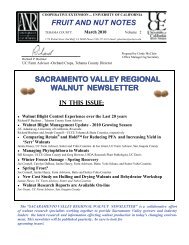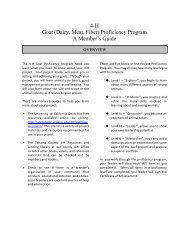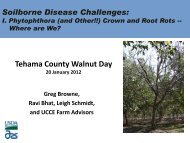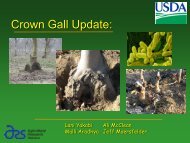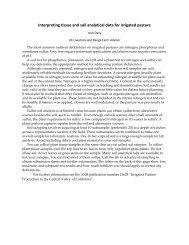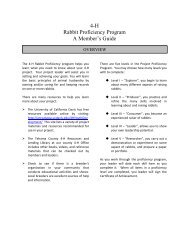New Walnut Rootstocks
New Walnut Rootstocks
New Walnut Rootstocks
Create successful ePaper yourself
Turn your PDF publications into a flip-book with our unique Google optimized e-Paper software.
<strong>New</strong> <strong>Walnut</strong> <strong>Rootstocks</strong>Gale McGranahanPlant SciencesUniversity of California, Davisghmcgranahan@ucdavis.edu
Old walnut orchard on black seedlingrootstock, also known as NCB, NorthernCalifornia Black.
There is more than one speciesof black walnut in California.• Northern California black walnut• Southern California black walnut• Arizona black walnut• Texas black walnut• Eastern black walnutAnd the species makes adifference in performance.
Paradox <strong>Walnut</strong> RootstockBlackParadox
Paradox walnut• Luther Burbank (1914) named and first described Paradoxwalnut: “As compared with seedlings of either the Californiaor the Persian walnut, they manifested an enormouscapacity for growth. Indeed they sprang forward at such arate as presently to dwarf their pure breed relatives.”
What is a Paradox walnut?• Historically: a hybrid seedling produced froma cross of northern California black walnutand English walnut.• Commonly: a hybrid between any blackspecies (usually northern California blackwalnut) and English walnut.• Used as rootstock for English walnut.• Can be seedling or clonal rootstock.
How is Paradox seedlingrootstock produced?• Nurseries usually havefound their own uniqueblack walnut mothertrees that produce ahigh percentage ofParadox seedlings.• Seed are planted in thenursery row to producea one or two year oldgrafted or ungraftedtree.
Do different black walnut mother treesproduce Paradox seedlings of similarquality?• This was the start of the Paradox Diversity Study(PDS).• What is quality in walnut rootstocks?•Vigor, high yield efficiency, resistance to pestsand diseases, graft compatibility andtransplantability.
Paradox Diversity Study• Nurseries came together and donated seed. A doubleblind study. (1996).• The <strong>Walnut</strong> Improvement Program made controlledcrosses between English walnut and different blackwalnut species.• Nurseries that grew the seed were Burchell, Dave Wilsonand Driver.• Seedlings were then distributed for testing againstnematodes (McKenry), Phytophthora (Browne), andcrown gall (McKenna first, now Kluepfel.)• Seedlings were also planted in 4 field trials for long termevaluation by Farm Advisors.
Results of testing (screening)• Some families of seedling Paradox weresuperior to others.• Some individual seedlings were far superior.• The far superior individuals needed to be retested.• Micropropagation.
Micropropagation
Terminology• Clone – A group of plants reproduced from a singleindividual by vegetative means (grafting,micropropagation etc.) that therefore have the samegenetic make up.• Clonal rootstock – Rootstock that is selected,(micro)propagated and made available for nurseries orgrowers.• Own-rooted varieties - also micropropagated, but notgrafted e.g. own-rooted Chandler
Nematode screeningMichael McKenry et al., UCR• McKenry inoculated hundreds of seedlings fromthe Paradox Diversity Study with nematodes.• Some families were better than others.• Some individual seedlings were far superior.• Those far superior seedlings weremicropropagated and retested.
Nematode tolerant rootstock.Michael McKenry30002500200015001000VX 211AX150000 Pv 1 Pv 20 Pv 500 Pv
VX211• A clonal Paradox (NCB x English) walnutrootstock with:• Exceptional vigor• Tolerance to nematodes• Some resistance to Phytophthora• Excellent survival in orchard replant trials• <strong>New</strong> large scale trials are underway• Nurseries are licensed to sell VX211
Phytophthora screeningGreg Browne et al., USDA/ARS• Greg Browne inoculated hundreds of seedlingsfrom the Paradox Diversity Study.• Some individual seedlings were far superior.• Those that were far superior weremicropropagated and retested.
Phytophthora screening
Susceptibility to Phytophthora citricola, 2006greenhouse evaluation100Phytophthora citricola806040200Percent crown length rottedAX1AZ1AZ2AZ3NZ1GZ1GZ2JX2PX1VX211VlachRX1UX022UX1UX2Wip2Wip3NCBcal (maj x hin) x nig hin mic cal x nig hin x reg *
RX1• A clonal walnut rootstock withresistance to Phytophthora citricolaand P. cinnamomi.• Texas black walnut X English walnut.• Smaller tree, less vigorous thanVX211.• Excellent survival in orchard replanttrials• <strong>New</strong> large scale trials are underway• Nurseries are licensed to sell RX1
Screening for crown gall resistance.McKenna, Kluepfel and Hasey• McKenna screened hundreds of Paradoxseedlings for crown gall resistance.• Several Individual seedlings with apparentcrown gall resistance were identified.• Superior seedlings were micropropagatedand retested by Kluepfel and Hasey
Crown gall screeningThere is one Paradoxclone that appears tohave some resistance ingreenhouse trials.Kluepfel is now screeningmany walnut species andfinding better ones.
Vlach• One of the first Paradox clones to bemicropropagated.• 7-10 years in grower’s fields.• Susceptible to nematodes• Phytophthora –variable response• Vigorous• Good survival
Labs that produce clonal rootstockfor nurseries• North American Plants, Oregon• VX211, RX1, Vlach• Vitrotech in Spain• VX211, RX1, Vlach, Chandler, Vina, Serr, and Howard.• ProTree• VX211, RX1, and Vlach• V-Tree• VX211, RX1, Vlach, WIP3, Chandler• <strong>Walnut</strong> Improvement Program, UC Davis• Only for experimental purposes. Over 40 different clones.
Type of materialproduced fornurseries
Duarte Nursery sellsmicropropagated plantletsdirectly to growers.
What nurseries have clonal walnutrootstock?• Burchell Nursery- licensed for VX211 and RX1• Duarte Nursery- licensed for VX211 and RX1• Reisner Nursery- licensed for VX211 and RX1• Sierra Gold Nurseries- licensed for VX211 and RX1• Dave Wilson- licensed for VX211 and RX1• Bonilla Nursery- licensed for VX211• Green Tree Nursery- licensed for VX211• Stuke Nursery- experimental stage• Suchan Nursery- experimental stage
Clonal rootstock availability• Most nurseries had some clonal paradox inthe ground or in pots in 2008.• Mainly VX211, RX1 and Vlach.• Available grafted or not.• Depending on growth some plants could beready 2009 but more likely 2010.
Nursery stock to consider:•Seedling (grafted or not)•Black•Paradox•Clonal rootstock (grafted or not)•Vlach•VX211 Experimental•RX1•Own-rooted varieties (no rootstock)•Chandler•Vina•Serr•Howard
THANK YOU• UC, UCCE and USDA researchers for collaboration.• Nurseries for time, space and expertise.• Growers for planting experimental trees and orchards.• <strong>Walnut</strong> Marketing Board and IAB (CDFA) for funding.• You for your attention and questions.



